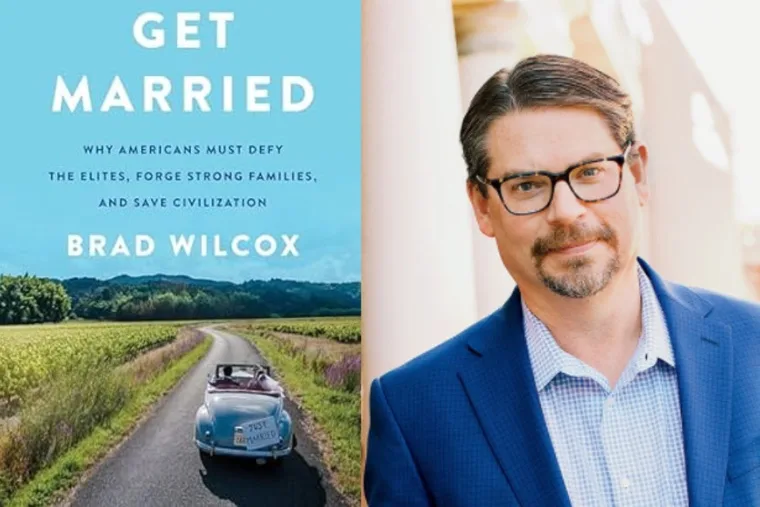Amidst an increasingly complex world, many young people – both Christians and non-Christians – are skeptical of marriage’s relevancy and necessity. One scholar, however, argues that they shouldn’t be.
In a recent podcast episode, University of Virginia sociologist Brad Wilcox joined Madison’s Notes host Annika Nordquist to discuss his new book Get Married: Why Americans Should Defy the Elites, Forge Strong Families, and Save Civilization. In this conversation, Wilcox and Nordquist discussed common contemporary beliefs about marriage, several of which Wilcox debunked.
Nordquist began by asking Wilcox about American divorce rates, asking why Wilcox supports marriage when so many do not succeed. Wilcox noted that there are many factors which can lead to divorces (and some should, he said, like domestic violence and adultery). He also warned against a “me first” mentality that our culture often pushes towards. In such a mentality, individuals focus on their own well-being, and “don’t embrace the all-in mentality that we see classically linked to marriage,” seriously undermining their chances of marital success.
Wilcox also noted that conservatism and college education are often indicators of stable marriages – especially conservatism. Nordquist inquired whether conventional advice to only get married once some degree of career stability is achieved, and Wilcox argued it depends on a few factors. If individuals have “a complex relationship history,” he suggested, getting married until one’s late 20s or early 30s often leads to stabler marriages. Getting married during one’s mid-20s does not increase divorce rates, however, especially if the couple are religious and do not cohabitate prior to marriage.
“If you meet someone who’s a really great person and there’s a great friendship in college, there is nothing that should stop you from getting married to that person [in your] early 20s, mid-20s, whatever. But you can’t assume they’re just going to be waiting for you when you hit 28,” the sociologist advised.
Asked whether men and women should get married at different ages, Wilcox suggested that men often mature more slowly than women, so it makes sense that men are sometimes older than their wives. The sociologist did not say this should be normative, however, suggesting that demonstrated maturity and work ethic are more important than age itself.
“When you look at who’s getting married, you do see plenty of evidence indicating that women tend to prefer guys who are doing well when it comes to either education or work or some other kind of important socially valued domain,” Wilcox stated. He added that marriage is financially beneficial for both men and women, despite concerns that many young people have about the costs of raising families.
Addressing concerns about the number of “marriageable” men, Wilcox stated that young men do often need to be more intentional about their pursuit of work, education, and physical fitness. He also suggested that young people ought to pursue career opportunities in geographical regions which are more likely to have higher numbers of compatible members of the opposite sex.
Wilcox also noted that despite concerns among young people about pregnancy, giving birth, and having children in general, women who are married and have children are much happier than women who are single and do not have children.
“Marriage and parenthood are sources of enormous meaning and purpose and direction,” he commented.
Wilcox’s observations are largely compatible with what Scripture has to say about marriage and family. Marriage is an institution ordained by God at creation and thus good (Genesis 1:26-31, 2:18-25). God also commanded Adam and Eve to “be fruitful and multiply” (Gen. 1:28); this command, often called the creation mandate, indicates the goodness and necessity of procreation.
The sin and evil brought into the world through the Fall negatively affects marriage and childbearing (Gen. 3:16-19); a union of two sinful people is necessarily impacted by their sin. The Fall and the subsequent sinfulness of all men and women (except Christ) does not, however, negate the goodness of marriage and procreation.
The book of Proverbs often speaks of the worth of a good wife (Proverbs 12:4, 18:22, 19:14, 31:10-31), and an entire book of the Old Testament describes a passionate relationship between a man and a woman (though the exact meaning of the book is hotly debated by biblical scholars).
Both the Old and New Testaments also heighten the significance of marriage beyond its natural goodness and benefits by revealing it as a picture of God and his people (Isaiah 54:4-8, Ephesians 5:22-33, Revelation 19:6-10, 21:1-4). Furthermore, the creation mandate is repeated to Noah following the flood (Gen. 9:1-2), and children are considered a blessing elsewhere in Scripture (Psalm 127:3-5).
It is worth noting that singleness can also be good (1 Corinthians 7:8). Like Wilcox noted of marriage, however, singleness must be ordered towards service of God and others (1 Cor. 7:32-35). Singleness is, however, on the rise in the United States, and marriage is not: nearly half of American adults are not married, and nearly 40 percent have never been married.
Given this harmony of sociological and biblical data, young Americans wary of marriage would do well to heed Wilcox’s research. Marriage and family are good things ordained by God for the benefit of his people and the human race as a whole. Wilcox’s research demonstrates that this is not merely an abstract truth: it has clear implications for our individual lives as well.






Comment by Diane on May 2, 2024 at 6:11 pm
My late dad said couples ought to have $5K in the bank before marrying. He was observant: unforeseen situations arise that cause economic stress on relationships. I would agree. Marrying a little older with an economic cushion in place is not a bad idea. Both economic stress, health issues, and marrying too young to recognize our long-term goals were incompatible were factors when I divorced. My ex and I remained caring friends and found greater happiness after divorce. Because of health issues and an awareness that the marriage wasn’t as stable as we’d like, we chose not to have children. Kids need emotional support and stability. I don’t regret not having children, because I firmly believe it was the right, responsible decision, I feel like I really missed out on never being a parent (though I was a teacher for 35 years). I skip church on Mother’s Day, always going out to buy myself a gift after several horrid experiences in churches on Mother’s Day (does anyone know how it feels for all the moms to get a flower in church and be the only woman left out?)
I have had a good life, never re-marrying. I’m not wealthy, but I would suggest marriages might experience greater stability when a couple, or a single person, learn to live within their means with an added bonus of a savings account.
I also always recommend couples be aware that our government financially rewards marriage – a wonderful comfort when one loses a spouse to death or divorce. Surviving spouse social security income for and income for dependents is a government benefit that folks without a marriage certificate lose out on. When a spouse or divorced spouse dies, that monthly income starts at 60 (divorced persons who re-marry before 60 dont qualify…the law actually discourages divorced persons from re-marrying). This income can be a life saver, and of course, dependent children are eligible for social security, too.
That’s my take. Marry for love and companionship, but smart economics helps, too.
Comment by Alan on May 6, 2024 at 9:50 am
Men would have to be fools to get married these days. They get the short shrift in custody battles, child support, and alimony. Women these days aren’t the kind of people who make good partners. Never enter a contract with someone who benefits from breaking it.